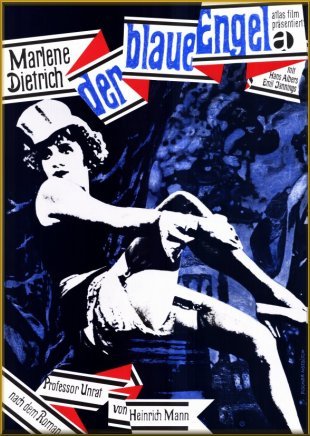Jean Grémillon – Gueule d’amour AKA Lady Killer (1937)

Gueule d’Amour
Made partly while Grémillon was working at the Ufa Studios in Berlin, this film features the young Jean Gabin as a foreign-legion Casanova – the “lady killer” Lucien Bourrache – who meets his match in the mysterious seductress Madeleine (Mireille Balin). The sizzling electricity between Gabin and Balin made Gueule d’amour a rare popular success for the director.

Quote:
It’s amazing that a film of this quality should be so completely unknown. Made in 1937, it’s the masterpiece of Jean Gremillon, Jean Renoir’s only serious rival in the prewar French cinema. Difficult to define stylistically (which is perhaps the secret of its greatness), the film consists of a series of tonal variations on the theme of the femme fatale, ranging from romanticism to naturalism to sophisticated comedy. Jean Gabin is “Gueule d’amour” (“Lover Lips” ) a soldier famous in his garrison town for his way with women; when he meets the mysterious Mireille Balin (Gabin’s costar in Pepe le Moko), he gives up everything to follow her to Paris. Gremillon seems the master of every style he attempts, but his genius lies in the smooth linking of those various styles; the film seems to evolve as it unfolds, changing its form in imperceptible stages.

Plot :
The English-language title of this French slice-of-life drama is Lady Killer, an apt description of anti-hero Lucien (Jean Gabin). A colonial cavalry officer, Lucien gives his love to whomever he fancies, then forgets about them as he moves from post to post. The one he can’t forget is Madeline (Mireille Balin) , and the feeling is mutual. Years later, Lucien is the wretched, embittered proprietor of a rundown Parisian café. Who should come back into his life but Madeline — a reunion that ends tragically for them both, literalizing the film’s title and leaving Lucien even more devastated than before. ~ Hal Erickson, All Movie Guide

Quote:
In France, Jean Grémillon is known as a great pre-New Wave French director, second only to Jean Renoir. In America, he’s barely known at all, partly because only one or two of his films are available on video, and even then they’re very hard to come by. His obscurity here was somewhat rectified by a comprehensive program of his films at Brooklyn’s Bam Rose Cinemas a year or two ago. It was in that program that I had the pleasure of seeing Grémillon’s Gueule d’amour, also known as Lover Boy or, more pointedly, Lady Killer. It’s a haunting film. Jean Gabin plays Lucien, a provincial soldier with a Don Juan reputation who meets his match in a rich Parisian, Madeleine (Mireille Balin). The class struggle in their queasy dance of death eventually gives way to a brutal sexual conflict that ends in murder and abasement. Gabin, with his soft voice and sensual hesitations, never had a more suitable role, and Balin brings a palpable erotic charge to her femme fatale part. The film clings to the honeyed morbidity of sultry music and smart talk, yet it also puts the sting into an archetypally Gallic l’amour fou. Gueule d’amour is a perfectly proportioned movie. Though the dialogue is excellent, it never overwhelms the main event: the images. (By contrast, Marcel Carné’s once highly regarded French noirs now seem totally dominated by Jacques Prévert’s scripts).
In Gueule d’amour’s opening scenes, Grémillon moves the camera lightly and infectiously, always reacting to music (the director had trained as a musician). Later on, when the mood darkens, Grémillon slows down and stages several painterly images of Lucien’s degradation; the camera is static in the last scenes, and the chilly compositions unforgettably express Lucien’s humiliation. In the world of Gueule d’Amour, happiness is quicker than Mozart, and despair is methodical and melancholic as Brahms. René Lefèvre, who had played in The Crime of Monsieur Lange for Renoir two years earlier, is ideally cast as the third lead character, René, a child-like, touchy-feely friend of Lucien’s who loves him in the pure way that Madeleine does not. What’s really startling about the ending of Gueule d’amour is that it takes the misogyny of French films from the ’30s and brings it to its logical conclusion: love between men. When René kisses Lucien on the cheek like a loyal lover and waves goodbye to him as his train pulls away, he has become a martyred romantic heroine, like Bette Davis in 1942’s Now Voyager. Exquisite and disturbing, Gueule d’amour is still one of the screen’s least seen masterpieces.


700MB | 01:28:18 | 512×384 | avi
http://nitroflare.com/view/4FE18D37AC05971/Gueuledamour.avi
http://nitroflare.com/view/DF78987EF35F66E/Gueule_D%27Amour_1937.ENG.opensubtitles.srt
Language(s):French
Subtitles:English
If you enjoy this blog, you can support it by buying a NITROFLARE premium account from the links above. Thank you for your support



![Alexandre Volkoff - Casanova [English intertitles] (1927) Casanova (1927)](https://worldscinema.org/wp-content/uploads/2021/12/Casanova-1927.jpeg)

